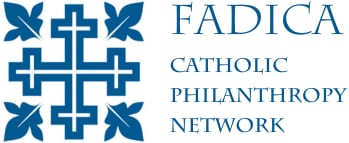Washington, DC – A newly published, 36-page conference proceedings tells Catholic foundations and donors that lay leadership development in the home missions among Hispanic Catholics, is an essential first step in a pastoral strategy to prevent attrition to other faiths.
“Studies show one in four third-generation Hispanics are leaving for other churches–if not more!” says Jerry White, Director of Youth and Young Adult Ministry in the Diocese of Charleston, SC, speaking before members of FADICA in May. “Why? Because they don’t feel included. They don’t feel part of the church. And we as the Catholic church sometimes are not very welcoming,” the diocesan official remarked.
The conference entitled: A Vibrant Future: Developing Hispanic Leadership in the Home Missions, was co-sponsored by Catholic Extension and FADICA to learn about the severe financial needs of Catholic home mission dioceses, many of which have been overwhelmed by fast-growing populations of Hispanic immigrant families.
“In our diocese we have 162 priests. But active in the diocese there are only 58, including only 12 Hispanic priests,” explained Rhina Medina, Regional Director Hispanic Youth Ministry in the Diocese of Charleston. “But our Hispanic youth ministry coves 92 parishes and 24 missions,” she added. “We have to find the resources and the training to enable them to accompany our people in their faith journey. Most of them feel alone in this country.”
Catholic Extension, in partnership with participating home mission dioceses and private donors including members of FADICA, are developing 100 new lay Hispanic leaders who will serve in the dioceses to coordinate a welcoming church presence in territory often lacking in church personnel.
“This kind of start-up initiative makes sense,” says Extension’s president, Rev John Wall. “After three to five years, the presumption is, this leadership is going to involve greater investment and greater participation by the Latino and Hispanic communities on the part of dioceses,” he noted.
The greatest challenge today is that only 8 percent of the estimated 30,000 lay ecclesial ministers nationally are Hispanic, according to Arturo Chavez, President of the Mexican American Catholic College in San Antonio, another speaker at the Extension/FADICA conference.
“Wherever we go, you have a paid staff for the English speaking and you have a volunteer staff for the Spanish speaking. These are people that often have very little formation, so there are great gaps that need to be addressed in a more just way. But also in a way that plans for our future and for future growth,” Dr. Chavez noted.
Other conference speakers included Verónica Rodríguez of the Office of Hispanic Minsitry in the Diocese of Kalamazoo, MI; Jesús Abrego of the Diocese of Beaumont, TX; and Eduardo “Lalo” Barragán, from the Diocese of Yakima, WA.


